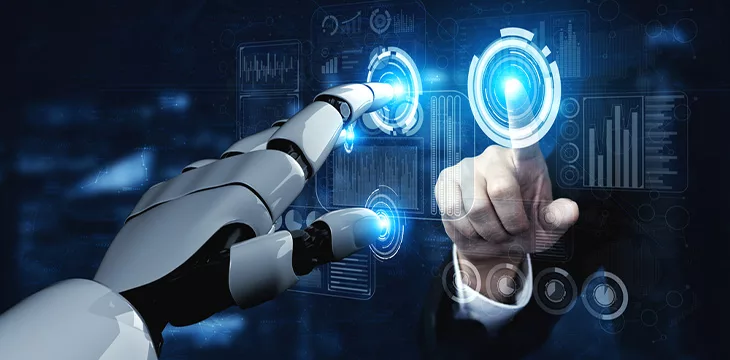|
Getting your Trinity Audio player ready...
|
Two recent stories spooked me. The first was about artificial intelligence (AI) experts warning the U.S. Congress that it could be used to create bioweapons and viruses within two years. The second was that the U.K. government is investigating Sam Altman’s Worldcoin over its data handling processes related to offering digital tokens for iris scans.
It doesn’t take Einstein to prove that private companies creating identity databases they control, complete with iris scans and rogue states weaponizing out-of-control AI, is a recipe for dystopia.
Yet, there is a solution to tech overlords controlling everything and shadowy figures developing bioweapons to harm us; decentralized proof-of-work blockchains. Let me explain how they can solve each problem in turn.
Let’s not let Worldcoin scan everyones’ eyeballs
While out-of-control AI in the hands of ISIS is arguably the more concerning problem, I’m equally worried about a tech CEO nobody had heard of until recently offering people payment for eyeball scans. Clearly, the U.K. government is worried, too, which is why the Information Commissioner’s Office is investigating Worldcoin to discover how it handles data. Honestly, I’m more worried about it from a control perspective.
Should a private company be building a global identity system and controls and collecting/storing sensitive information such as iris scans? Some would argue it’s the free market at work—nobody has to take the bait, but it’s still seriously uncomfortable to think about the sort of world this could lead to. What if World ID becomes the de facto system everyone uses, and its executives have the power to shut you out?
Wouldn’t it be much better to build a decentralized identity system on Bitcoin, which no single party controls? In his recent Bitcoin Masterclasses in London, Dr. Craig Wright outlined how such a system can be built. Unlike World ID, a Bitcoin-based system would enhance privacy. Users would be in complete control of their data and could prove things such as their address or age without sharing other details about themselves.
Call me crazy, but I’d much rather trust the Bitcoin blockchain than Sam Altman and Worldcoin. Even if he is a saint, the potential for hacks and data leaks in such a private identity system is terrifying. With one built on Bitcoin, there’s no attack surface or data honeypot, so hacks are not worth attempting, even if they could be conducted.
While a digital identity system is inevitable—I’d prefer it to be encrypted on the world’s greatest proof-of-work blockchain than in the hands of yet another Silicon Valley-backed tech bro.
Now, let’s move on to the bit where Al Qaeda could use AI to create a supervirus that wipes out vast numbers of humans.
What did the experts say to Congress about the dangers of AI?
I know all experts are incentivized to tell Congress the sky is falling to secure funding. Still, if even some of what Yoshua Bengio, Dario Amodei, and Stuart Russell told them is true, we could be headed toward a dark future.
Amodei, CEO of AI startup Anthropic, told them that advanced AI could be used to create deadly viruses and bioweapons within two years.
Bengio, an AI professor at the University of Montreal, told Congress that the world needs to deal with AI as it dealt with nukes; nothing short of international cooperation on the same scale will mitigate the dangers.
Yet, getting to grips with it won’t be easy. Russell, a Computer Science professor at Berkeley, acknowledged that AI’s functionality makes it much harder to manage than other technologies.
So, what are we to do? Should we just throw our hands up and say we’re beat? Should we just trust the experts? Neither; blockchain technology can help prevent the misuse of AI, too.
How so? The blockchain is an immutable ledger, meaning anyone can track and trace what’s going on, including in the development of AI. Malicious actors could still train AI to misuse data for nefarious purposes, but there’d be an undeniable evidence trail that they did so, and someone would likely figure it out while it was happening, given the ledger is public.
With a Bitcoin-based identity system, the identity of those working on AI could be verified and controls put in place. While there’s no way to stop someone from setting up their own systems, access to sensitive data of the kind used for creating bioweapons could be tracked and traced using blockchain. Just as Sentinel Node is using the BSV blockchain to log access and changes to files in computer systems, access to advanced scientific information could be protected in the same way, and changes to AI systems could be logged.
By logging AI development activities on a public blockchain, authorities can look at an audit of the transparent records created to ensure compliance. I’m usually a ‘hands-off’ kind of guy when it comes to regulations, but when we’re talking about a technology that could lead to terrorism on a scale we can’t fathom, I’m willing to give a little. Time-stamped records of activities create accountability, which we need here.
While blockchain isn’t a solve-all in the brave new world we’re entering, it can mitigate some of the risks and create a situation in which bad behavior is disincentivized because rogue actors know they’ll leave evidence behind.
Can blockchain save us from the misuse of AI or dystopias in which a tech CEO has a scan of everyone’s eyeballs? No, but it can help us save ourselves from such a fate, which is a step in the right direction. Let’s unleash the true power of blockchain technology to create a more transparent, safer world. The clock is ticking, and we can’t afford to fumble the ball this time.
Watch: Alex Ball on the future of tech: AI development and entrepreneurship

 03-01-2026
03-01-2026 




